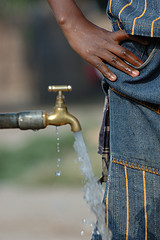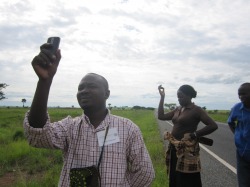Central African Republic - Human Rights Center
In the fall of 2009, HRC researchers conducted a population-based study in the Central African Republic (CAR) to study the population's priorities and needs, exposure to violence, security, and transitional justice, among other things. The resulting report, "Building Peace, Seeking Justice: A Population-Based Survey on Attitudes about Accountability and Social Reconstruction in the Central African Republic", provides a clearer understanding of the scope and magnitude of the conflict, as well as the association between exposure to violence and traumatic events with self-reported physical and mental health status. The CAR study, funded by the John D. and Catherine T. MacArthur Foundation and Humanity United, was the second Human Rights Center project to utilize digital data collection with the KoBo suite of software.
The MacArthur Foundation profiled the study in the YouTube video below:
The MacArthur Foundation profiled the study in the YouTube video below:
Ghana - Johns Hopkins University

In 2007, the Johns Hopkins Center for Water and Health (JHUCWH) began a prospective observational study evaluating the impact of community-owned water vending kiosks along with community mobilization and hygiene education on village access to potable water in rural Ghana. Each kiosk was purchased from a for-profit corporation by the village through a long-term loan and is comprised of advanced water treatment technology intended to treat surface water to meet World Health Organization (WHO) drinking water guidelines. In August 2010, JHUCWH will return to Ghana for the third year of data collection to explore the effectiveness of the kiosks to improve household drinking water quality, the impact of kiosk use on waterborne disease prevalence, and household- and village-level factors associated with uptake and usage of the kiosks. To improve the quality of data and allow for surveys to be conducted in multiple languages, the team will introduce Android-based devices using Open Data Kit and KoboPostProcessor. This research is funded by the Osprey Foundation of Maryland and the Global Water Program at Johns Hopkins University.
Uganda

In August 2007 the Human Rights Center piloted the first iteration of Kobo for the study "When the War Ends: A Population-Based Survey on Attitudes about Peace, Justice, and Social Reconstruction in Northern Uganda". The survey of 2,875 residents of eight districts in northern Uganda captured attitudes about peace, justice, and social reconstruction while peace talks were taking place between the Ugandan government and the LRA in Juba, south Sudan. The 2007 project served as the proof of concept for KoBo, utilizing the Mio A700/701 PDA.
The KoBo team returned to northern Uganda in spring 2010 to conduct a follow up study, this time using the Android-based HTC myTouch. The resulting report will be published in the fall of 2010.
The KoBo team returned to northern Uganda in spring 2010 to conduct a follow up study, this time using the Android-based HTC myTouch. The resulting report will be published in the fall of 2010.
